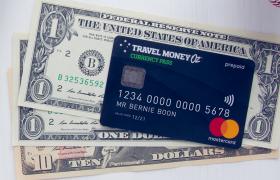Prepare to have your mind blown when you visit China and realise there is more to the country than a Great Wall and dumplings.
China presents travellers with perhaps the most significant culture shock of all, as it’s monolithic cities contrast with remote villages and scorching summer days are met with snowy winter nights. Similar to a meal from your local Chinese takeout, a trip to China will leave you satisfied and craving more.
Planning a trip to China isn't quite as easy as choosing your Saturday night noodle dish though, especially when you consider how big the country is. Things become even more complicated when you start planning your travel budget and converting between Aussie dollars and Chinese Yuan.
At Travel Money Oz, we aim to take the hassle out of foreign currency, which is why we've come to the rescue with a nifty holiday budget calculator and Chinese travel budget guide. We've made it so easy, that you could punch in your budget details while simultaneously shovelling takeout chow mein into your mouth. Sounds like a pretty exciting Friday night if you ask me.
Before we fire up the calculator and dig into the chow mein, let's have a look at what could be included in a Chinese travel budget.
What goes into a budget for China?
Transport
There are regular flights from Australia to major Chinese cities so you should have no issues scoring a deal on flights. Expect to pay between $500 and $900 - anything more and you can probably shift your dates to get a better price.
Once you arrive in China, chances are you're going to want to travel around the country a bit. Don't let the fact that it is over 9.5 million square km's deter you, instead prepare for a few travel days. You have a few options when it comes to cross-country travel:
- Flights: there are 30 domestic airlines in China, so if you're in a rush, there are plenty of options to get you around. While they aren't the cheapest option, they are affordable if you're in a hurry.
- Buses: These are a great option for intercity journeys that are less than nine hours. They are cheaper than trains and are comfortable enough for the distance.
- Trains: Choo-choose this option for longer journeys. There are bullet trains and sleeper trains that are perfect for overnight trips as it saves you paying for a nights accommodation and frees up your days for exploring. The lower bunks are cheaper, so book a few days in advance if you're keen to save some cash or aren't a fan of being on top.
- Car hire: China doesn't recognise international driving licenses, so unless you have a Chinese license car hire isn't for you.
Once in a city, you will be well served by buses and metro systems. Bus fares will set you back between 1-3 CNY and a subway ticket around 6 CNY. You can also catch a taxi, just ensure it is metered and has set prices. There is a slew of taxi scams so be cautious about those. If you have a group or are too full of honey chicken to catch the bus, you can download rideshare app DiDi to get you from A to B.
Finally, walking is always the cheapest way of getting around. Just keep in mind that air pollution is pretty bad throughout many of China's major cities, so it may limit how far you can and should walk.
Accommodation
Chinese cities have accommodation options for every traveller and budget. You will be able to choose between homestays, hostels, Airbnb's and hotels, so do a bit of research and see which option best suits your budget and the goal of your holiday.
Accommodation options may dwindle as you head further away from major cosmopolitan areas; however, you will notice a significant decrease in price. For example, a hostel bunk can cost anywhere between 50 and 100 CNY per night in a big city like Beijing, however, a similar bed will cost you less than 35CNY in a smaller town.
If you're after a truly authentic experience, we would highly recommend spending a few nights in a local homestay. Not only will you see how the locals live day-to-day, but you might also get treated to a delicious homemade meal.
Food
When it comes to Chinese food, I've found that, like many, I don't stop eating when I'm full. Instead, I load up my plate, eat way more than the recommended serving size, before collapsing onto the closest couch in a mixed cloud of regret and pure joy. There is a reason every town in the world has a local Chinese restaurant - Chinese food is delicious and loved across the globe.
Food in China is incredibly cheap, and you could easily spend less than $20 a day on delicious street dishes. It is cheaper to eat out then cook in China, so take this advice and go crazy trying anything and everything possible.
As a guide, you can expect to pay the following for Chinese dishes:
- Street vendors and markets: between 5 and 20 CNY per plate. Generally, this will be noodles, dumplings, pork buns, soup and rice dishes.
- Sit down meals: between 10 and 60 CNY per dish. This is still incredibly affordable and worthwhile for something like hot pot or bigger meals. Just keep in mind that you will have to pay extra for clean bowls and rice. Though, by extra we mean 4 CNY, which is less than $1.
If you're eating alone, be sure to ask for Xiao Pan, which is a smaller portion size. Or don't, we won't judge if you decide to smash a four-person serving of fried rice on your own. Calories don't count on holidays, right?
It's also worth noting that western food is quite expensive, and things like burgers or coffee can cost a similar amount to what you would pay back home. Also, the water isn't safe to drink, so buy bottled water and fill up at safe refill stations.
Activities
China has everything from Great Walls to Forbidden Cities, and underground warriors made of terracotta. The countries rich and intricate history means there is no shortage of monuments to visit and tours to join. Tours themselves aren't overly expensive, and you should be able to get a decent day tour for between 50 and 200 CNY. Hiking and outdoor activities can be slightly more costly, however, they are well worth the price as China boasts incredibly beautiful landscapes.
When you arrive in bigger cities, it's worth joining a free walking tour. Not only will you be able to gain your bearings in a new city, but you'll have a knowledgeable guide that will provide historical knowledge and plenty of tips on where else to visit and eat.
China's culture is so different from that of home, so it's worth taking a few classes to gain a better insight into a typical day-in-the-life. Cooking, dancing, tai chi, calligraphy and tea ceremonies are just some of the classes you can take part in. Who knows, you may go home with a new skill or, better yet, a new signature dish to cook at your next dinner party.
Pre-travel expenses
These are particularly important for China, as visas, travel insurance and immunisations are all necessary. The Chinese visa is not cheap, so be sure to include it in your budget calculations and give yourself plenty of time for it to arrive, so you don't have to fork out for express service.
Head to your doctor and be sure to have any of the relevant immunisations. While they can be a little expensive, chances are they will cover you for a long time, and you won't need to worry about them for your next trip.
Finally, don't just opt for your credit card insurance. If you do, be sure to read the PDS and ensure you are well covered for all activities.













